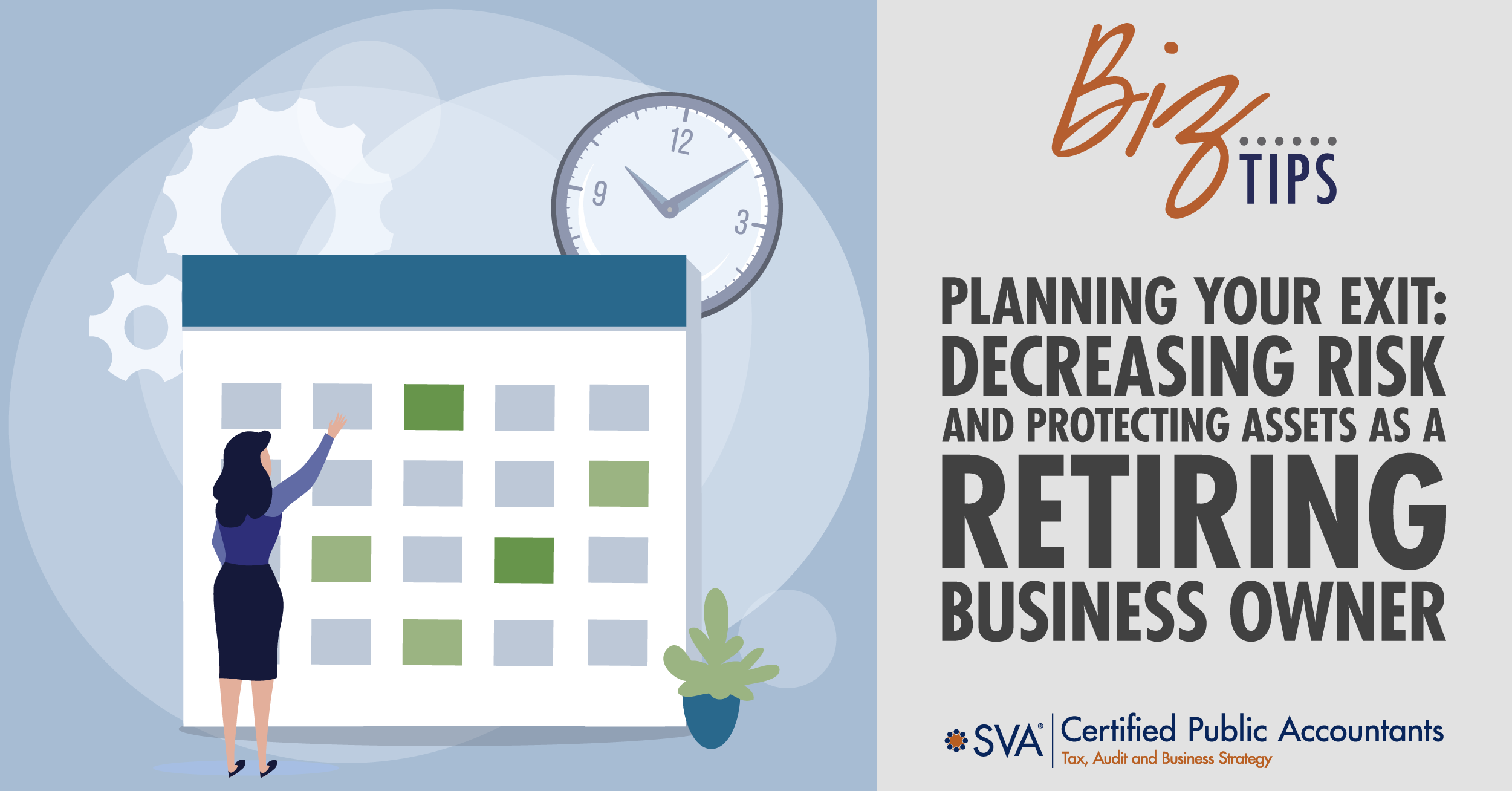There comes a time in every business owner’s life when they want to step away from their company. It might be time to retire, or perhaps you want to sell the company and move into another role or industry.
Whatever the case, business owners need a well-planned exit strategy to get the most out of their company—from getting top dollar for assets to minimizing risks and liability.
Planning well ahead of an exit can make the entire process run more smoothly and profitably.
(Download Video Transcript)
Managing Risk Long Before the Exit
Although managing risk is critical before you make an exit from your business, it is equally important as you run the company too. Putting policies in place now to address some of the most high-risk areas for businesses can decrease risk overall, making the company a much better investment for a new owner.
Evaluate Risk on Physical Assets
Physical assets can create risk including injuries and damage to people and other property. Something as simple as adding better door locks or security cameras can decrease the risk of theft, for example.
Having proper insurance to address premises liability is also critical to minimize the risk of a lawsuit for third-party liability.
Companies that are “equipment heavy” may also want to evaluate their equipment’s useful life as they start looking forward to an exit.
If you are considering selling the company, newer equipment can be very appealing to a new buyer. It decreases a new buyer’s risk that the equipment will break down in the near future.
Risks Related to Human Capital
For many companies, their team is one of their most valuable assets. The skill and knowledge that vendors, contractors, and employees provide can be very difficult to replace. As a business owner, you likely also bring extremely valuable skills and experience to the table.
However, if you are considering retirement, that knowledge may retire with you if you do not pass it along properly. Creating a solid team that you can “sell” to the next owner can be highly beneficial.
To decrease risk related to your human capital, be sure that you are providing necessary safety training and investing in ways to run a safe operation. Employee handbooks and standard operating procedures will also go a long way toward an efficient and safe environment.
In some industries, non-compete or non-solicitation agreements may be necessary to decrease the risk that employees will use your processes if they go to work for the competition.
Financial Controls and Compliance
Internal policies, procedures, and controls can significantly decrease risks related to legal compliance, data breaches, and even fraud and embezzlement. Having defined, written policies related to financial tracking, reporting, and management can be constructive to not only decrease risk but also gather information to show the value of a business.
For example, a regular practice of auditing and performing “checks and balances” for financial reporting will often allow you to spot areas of concern faster. Once you realize a problem, you can address it before it worsens.
Protecting Assets While Planning Your Exit
Business owners can also take steps to protect their personal and business assets as they work their way toward retirement.
While the previous tips to minimize risk will often also help protect assets, there are additional steps owners can take now to further protect their personal assets and the overall value of their company.
Uncouple Your Personal Assets from the Company
Many business owners choose to involve their personal assets in their business.
For example, they might pledge their personal assets as collateral for a business loan. They might personally guarantee loan payments or have assets that are really company assets in their name.
While these practices might have been useful at some point while building and growing your company, they need to be addressed long before you make your exit.
Untangling business and personal assets will allow you to make a much cleaner break from your company as you move into retirement.
Consider a Mandatory Buy-Sell Agreement
If you own your business with someone else, you might want to consider creating a mandatory buy-sell agreement.
These agreements set up specific terms and conditions to trigger a sale that the other owner must accept. In many situations, one partner just has to express that they want to sell to trigger a valuation and sale process, as further described in the agreement.
Buy-sell agreements can also be useful for single owners making a more gradual transition out of their company.
For instance, imagine you are selling the company to a friend or relative, but he needs some additional mentoring before he is ready to take over. In that situation, you might want to create a buy-sell agreement that forces a sale using a certain method at a specified period of time. That way, everyone is on the same page about how and when the sale will take place.
Get Help with Your Exit Strategy
Planning your exit will take time, but when business owners set themselves up for a clean exit well in advance, the entire process can be much smoother. Contact one of our accounting professionals today for more information.

© 2023 CPA ContentPlus

